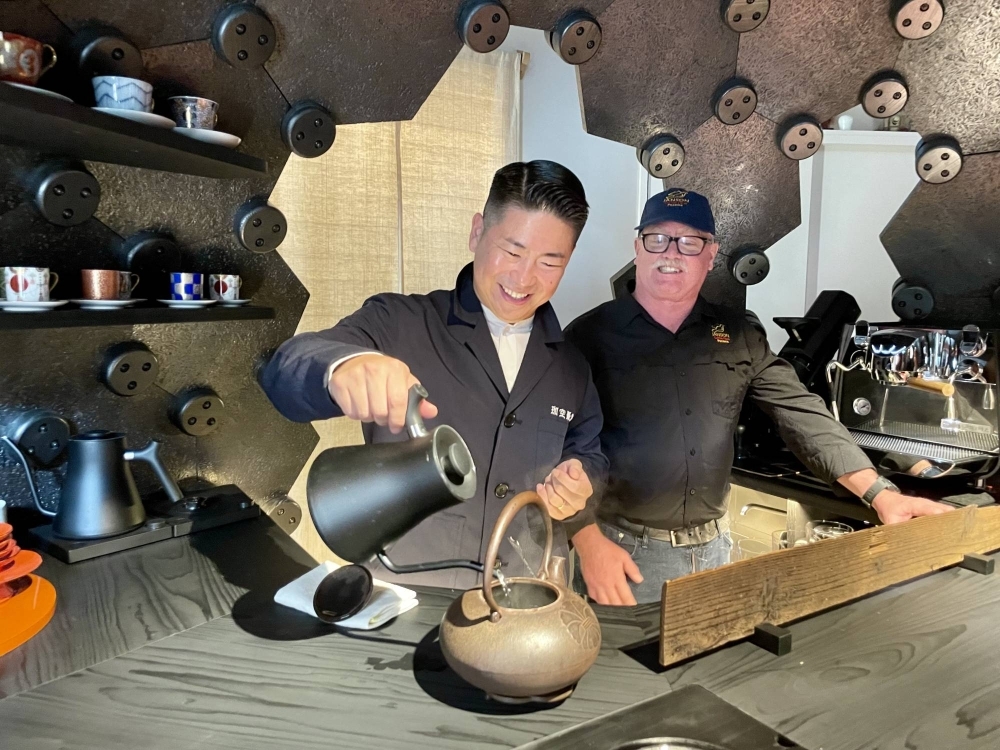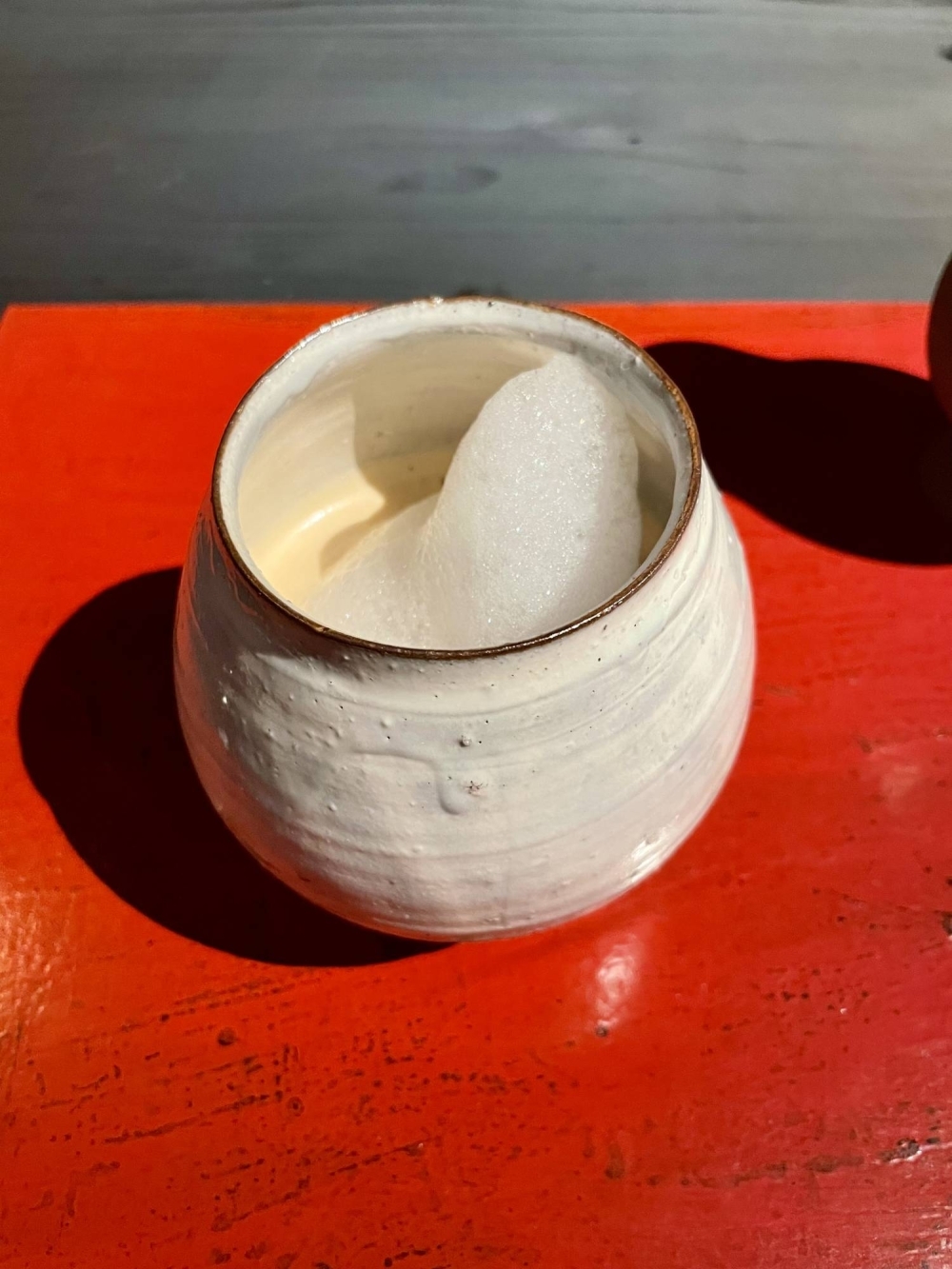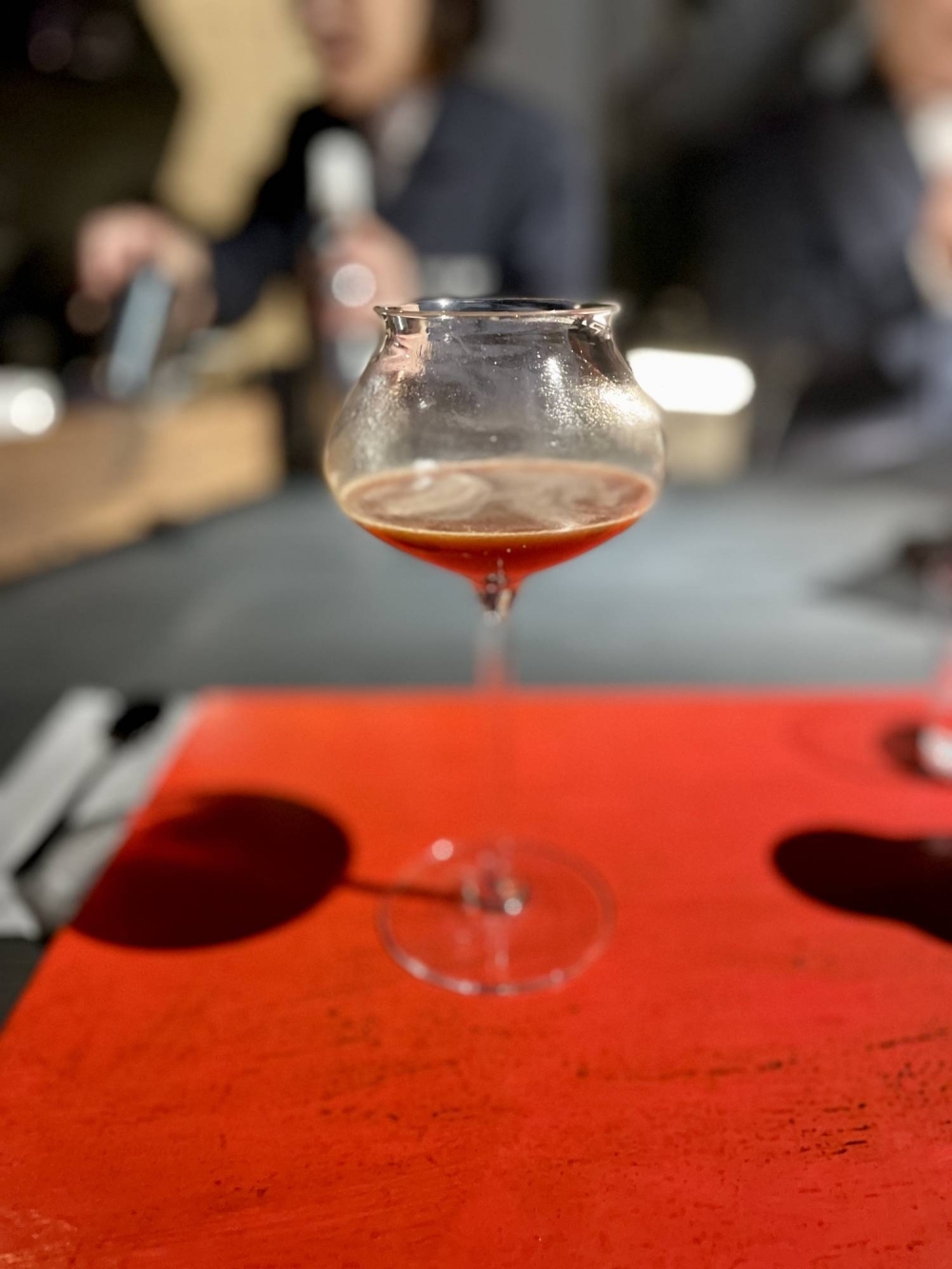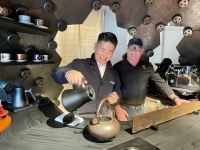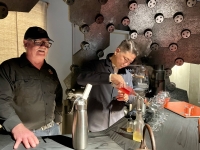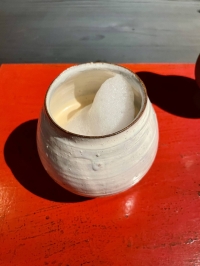“Coffee is all about art and science,” Hidenori Izaki says. “Now, I’m trying to create the fine-dining version of the coffee experience to show the true value of the drink.”
At Cokuun, the reservation-only coffee bar that the acclaimed barista and coffee consultant opened last year, Izaki presents his vision for the future of the brew. With an unmarked entrance hidden inside a building complex on the backstreets of Tokyo’s Omotesando district, the bar could be easily mistaken for a contemporary art gallery. Behind the glass door, you’ll see a massive, gunmetal gray orb that recalls the science fiction-esque installations of artist Kenji Yanobe. The sculpture, designed by architect Koki Akiyoshi to resemble a tetsubin (traditional iron teapot), houses a four-seat counter where Izaki and barista Miki Suzuki prepare innovative omakase (chef’s selection) tasting courses.
The sessions showcase rare varieties of coffee produced in miniscule batches and imported exclusively for Cokuun. Izaki’s approach to coffee takes its cues from the world of mixology, where the bean in all its forms is treated as a versatile ingredient. Served in astonishingly precise preparations, the drink is blended with seasonal Japanese fruits, unique ferments and spices to highlight different aspects of the coffee’s character. Original sweets from top Tokyo restaurants such as two-Michelin-starred Narisawa pair with the final course.
Izaki, who in 2014 became the first Japanese coffee professional to claim the title of World Barista Champion, started working with the brew when he was in high school at Honey Coffee Roasters, his family’s business in Fukuoka. Encouraged by a customer who regularly complimented him on his coffee-making skills, Izaki realized that he had a gift for interacting with guests and began contemplating a career as a barista.
“She helped me understand that I could make someone’s life a little better every day,” he says. “This is the meaning of coffee for me.”
Izaki immersed himself in studying the science of coffee brewing and the finer points of service. In 2012, he became the youngest Japan Barista Champion and went on to achieve a consecutive victory the following year. After winning the World Barista Championship, he mentored several award-winning baristas, including Suzuki, who placed second in the prestigious contest in 2017.
In 2019, he founded his consulting company, Qahwa. As a global coffee advisor and importer of specialty beans, he spent roughly 200 days abroad until the pandemic brought his international travels to an abrupt halt.
Being grounded in Japan prompted Izaki to embark on a deeper exploration of his home country. He visited producers across Japan — from sake brewers and shōchū distillers to farmers and ceramics artisans — and pondered ways to incorporate their wares into the coffee experience.
“I want to showcase the best of Japan, combined with elements of Western culture,” Izaki says, describing the concept as the “Zen of coffee.”
Drawing inspiration from fine dining and the artistry of tea ceremony, he envisioned a coffee experience marked by exceptional hospitality with a touch of speakeasy-style mystique thrown in. The result is Cokuun, which functions much like a private coffee club. Bookings are exclusively available on the website, requiring advance purchase. Upon payment, Izaki shares the location’s precise address and asks patrons to keep the information confidential.
The 90-minute tasting sessions on Cokuun’s regular program are usually led by Izaki or Suzuki (the bar’s schedule lists the name of the head barista for each session). This autumn, Izaki also launched a series of special tasting events featuring guest baristas and coffee producers.
Stepping inside the venue on an afternoon in September, I remove my shoes and take a seat in the compact waiting area. In a narrow alcove near the entrance, a single droplet of water falls into a stone basin below, evoking the tsukubai water fountains commonly seen in Japanese tea gardens. Izaki, smartly attired in a navy blue blazer, invites guests to climb into the giant orb through a small opening on the side. The entrance is reminiscent of the low doors found in traditional chashitsu tea ceremony houses; called nijiriguchi (translated literally as, “crawling entrance”), these small entryways require individuals to bow as they enter, symbolizing humility and respect.
Inside, the space is outfitted with an array of cutting-edge equipment, including a sleek coffee grinder and an espresso machine with a steamer custom-designed by Izaki. The curved, dark walls are lined with shelves displaying bespoke porcelain espresso cups.
Behind the counter, Izaki stands beside Kai Janson, the second-generation head of Panama-based specialty coffee producer Janson Farm. Janson has joined the event to present a rare variety of Maragogype, a natural mutation of one of the oldest cultivars of the Arabica coffee species. Janson Farms produces a scant two kilograms per year of its Maragogype Anaerobic Natural, and the coffee is renowned for its sweetness and elegant texture.
Janson starts the tasting course with a cup brewed over a W60 dripper fitted with a resin mesh net and a paper filter. The water, sourced from the Osuzuyama Distillery in Miyazaki Prefecture, is treated with minerals such as magnesium and boiled in an antique iron pot to enhance the water’s softness. The result of this meticulous process is a silky brew with finely balanced acidity and notes of sweet marshmallow and bitter cacao nib.
While Janson describes the history of his family’s farm and the challenges of growing the fragile Maragogype varietal, Izaki prepares the next course, which includes a sparkling coffee made with a fizzy concoction of Fuji and Bramley apples, tomato water and herbs fermented with wine yeast. The drink displays complex aromas of peppermint, chamomile and apple pie. After a lip-smacking, tart attack, a lingering sweetness blooms across the palate.
Next comes a warm latte consisting of a shot of espresso mixed with milk from Kikuchi Farm in Hokkaido that has been freeze-distilled, a process that involves freezing until the solidified water can be removed to create a concentrated and creamy liquid with intense sweetness. Flavored with a coconut-accented fig reduction and crowned with a foam of tachibana citrus, juniper and sanshō (Japanese pepper), the coffee is served in a handmade white ceramic cup by artisan Kai Tsujimura in Nara Prefecture.
The last course is an espresso-based mocktail made with pomegranate concentrate, hibiscus cold brew and fermented white peach. Izaki garnishes the libation, poured into a tulip-shaped wine glass, with garam masala and hop foam. The earthy undertones of the spice mix enhance the citrus notes and highlight the peach flavors in the coffee. A dessert prepared by Narisawa accompanies the drink: a soft and fluffy sponge cake, filled with grapes from Yamagata Prefecture and topped with a gelee of French Marc liqueur, served with unsalted umeboshi (pickled plum) from Wakayama Prefecture.
The refinement of the experience is complemented by serious and engaging coffee education, underscoring the importance of raising awareness of coffee production and ethical sourcing — a parallel to the principles of sustainable gastronomy often discussed in the restaurant industry. Throughout the session, Izaki and Janson weave in stories from global coffee cultures, in addition to outlining the chemistry and physics involved in crafting an outstanding brew.
“Coffee has been treated as a commodity throughout history, which means that farmers are sometimes paid less than the cost of production,” Izaki says. “We need to add value on the retail and service side to create a more sustainable industry.”
Jansen echoes the sentiment: “When you raise the value of coffee, that’s when you change the lives of producers.”



